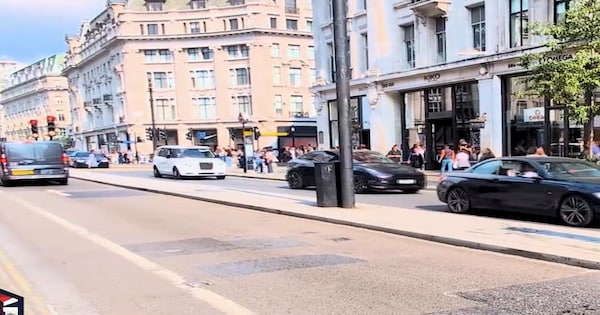– What opportunities does the traffic ban present for pedestrian-friendly initiatives?
How Will London’s Traffic Ban on Oxford Street Impact the British Economy
London’s Oxford Street is one of the busiest shopping districts in the world, attracting millions of visitors each year. However, concerns about air pollution and pedestrian safety have led the local government to introduce a traffic ban on Oxford Street. This significant change will undoubtedly have far-reaching effects on the British economy. In this article, we will explore the potential impact of the traffic ban and what it means for businesses, consumers, and the overall economy.
Effects on Retail and Hospitality Businesses
The traffic ban on Oxford Street is expected to have a significant impact on retail and hospitality businesses in the area. Here are a few potential effects:
- Decreased foot traffic: With limited vehicular access to the area, businesses may see a decrease in foot traffic, impacting sales and revenue.
- Shift in consumer behavior: The traffic ban may prompt consumers to seek alternative shopping and dining destinations, affecting businesses in the area.
- Opportunities for pedestrian-friendly initiatives: The ban presents an opportunity for businesses to focus on creating a more pedestrian-friendly environment, potentially attracting more foot traffic.
Impact on Logistics and Delivery Services
Logistics and delivery services will also be affected by the traffic ban on Oxford Street. Here’s what businesses in this sector should consider:
- Adaptation of delivery routes: Companies will need to adapt their delivery routes to comply with the new traffic regulations, potentially leading to increased operational costs.
- E-commerce opportunities: With limited vehicular access, businesses may see an increase in demand for e-commerce and home delivery services.
- Partnerships with local businesses: Logistics companies can explore partnerships with local businesses to optimize last-mile delivery solutions, enhancing customer satisfaction.
Repercussions for Property Owners and Real Estate Development
The traffic ban on Oxford Street could also impact property owners and real estate development in the area. Consider the following potential outcomes:
- Shift in property values: The ban may lead to a shift in property values as businesses and consumers adapt to the new traffic regulations.
- Opportunities for urban redevelopment: The ban presents opportunities for urban redevelopment projects that prioritize pedestrian-friendly infrastructure and public spaces.
- Demands for mixed-use developments: Property owners may witness increased demands for mixed-use developments that cater to the evolving needs of the area.
Environmental and Social Benefits
While the traffic ban on Oxford Street presents challenges for businesses and the economy, it also brings about several environmental and social benefits:
- Improved air quality: With reduced vehicular traffic, the area is expected to experience improved air quality, benefiting the health and well-being of residents and visitors.
- Promotion of active transportation: The ban encourages walking and cycling, contributing to a healthier and more active community.
- Enhanced public spaces: Businesses and residents can look forward to enhanced public spaces and a more vibrant community as a result of the traffic ban.
Conclusion
The traffic ban on Oxford Street is poised to bring significant changes to the British economy, affecting businesses, consumers, and various sectors. While there are challenges to navigate, the ban also presents opportunities for innovation, sustainability, and community enhancement. By anticipating and adapting to these changes, businesses and stakeholders can position themselves for success in the evolving landscape of Oxford Street and beyond.
The Impact of Banning Traffic on Oxford Street in London
London, one of the most popular cities in the United Kingdom, attracts over half a million visitors per day who come for various activities such as shopping, dining, and entertainment. To address the congestion issues, London Mayor Sadiq Khan has announced plans to ban traffic on Oxford Street. This decision will undoubtedly have significant implications for the economy, nearby shops, and local residents.
Economic Impact
The banning of traffic on Oxford Street is expected to bring about a significant change in the economic landscape of London City. With an increase in foot traffic due to the ban, businesses are likely to see more customers coming through their doors. This shift may result in increased sales opportunities for shops and restaurants located along the street. Consequently, it could also lead to an overall boost in revenue for these businesses.
Impact on Nearby Shops
For shops located near Oxford Street, this move could mean both positive and negative outcomes. On one hand, with reduced traffic and improved pedestrian access to their stores following the ban, they may experience an increase in walk-in customers. However, it is also essential to consider potential challenges such as delivery logistics or decreased visibility due to less vehicular traffic passing by.
Impact on Local Residents
The banning of traffic on Oxford Street is likely to have a direct impact on local residents as well. With reduced congestion and pollution levels resulting from fewer vehicles traversing the area, residents can anticipate improvements in air quality and overall well-being within their community.
This move aligns with efforts towards creating a greener city that prioritizes pedestrian-friendly environments while reducing environmental harm caused by excessive vehicular activity.
Conclusion
this anticipated ban holds promise for boosting economic activity while enhancing living conditions for nearby residents . It has varied implications for different stakeholders including businesses , shoppers ,and locals.Becoming one among multiple efforts aimed at decreasing London’s reliance upon car use,reducing pollution,and improving urban mobility,it signifies a progressive step forward toward fostering sustainable urban development within this vibrant city .


